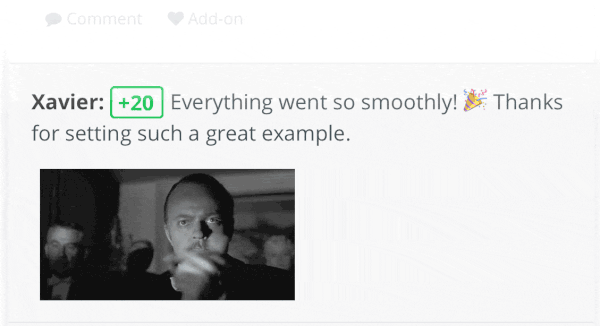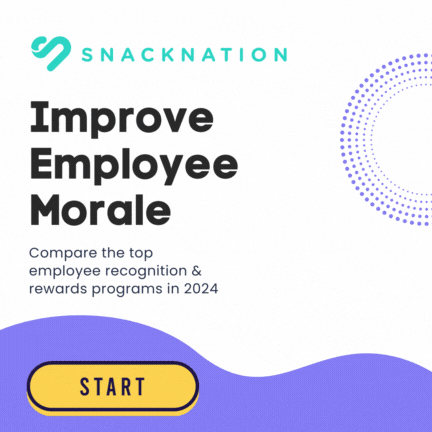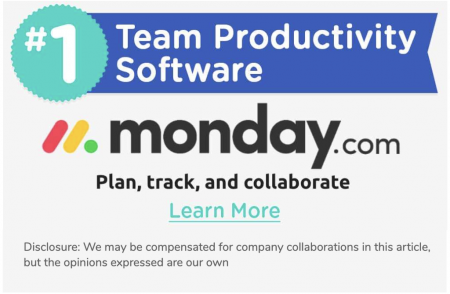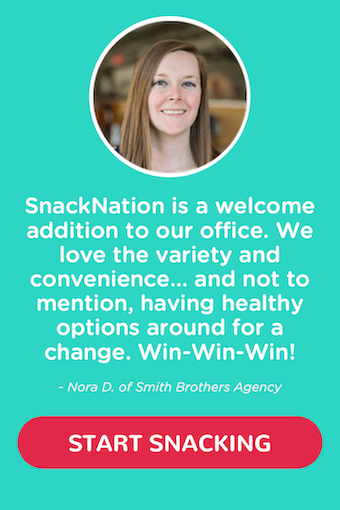Employee motivation is as complex as the answers you’ll get if you ever ask your employees what inspires them.
Each employee has their own preferences and similarly to love languages, some employees require a combination of approaches, gestures, and tactics to help bring out the best in them — but at the end of the day, investing in your people and cultivating talent from within is the way to go.
That’s exactly why we wrote this comprehensive guide about the different types of employee rewards for all of your different types of employees.
“83.6 percent of employees feel that recognition affects their motivation to succeed at work.” — NectarHR Click To TweetBroadly speaking, what modern workplace studies prove is that the paycheck matters, but it’s not enough to just pay well. Factors that would have been an afterthought in past decades matter to employees now and are, in fact, expected.
Financial reward is foundational, yet it’s widely accepted that other seemingly less tangible aspects of the job, such as a sense of purpose, appreciation, recognition, interpersonal connection, and professional advancement and development are equally vital.
To engage your workforce, you can leverage each of these incentives, systems, and building blocks of positive company culture through your employee rewards program.
In a hurry? These are some of our favorite employee reward systems & platforms:
| Motivosity | 🏆 Reward your team’s priorities, culture, and performance with premium incentives | Visit Motivosity |
| Bucketlist | 🎁 Award them an eGift | Visit Bucketlist |
| WorkTango | 🌟 Engage and retain employees with recognition, rewards, surveys, and more | Visit WorkTango |
| Bonusly | 🥇 Recognize and reward employees for their achievements and milestones | Visit Bonusly |
| Nectar | 😃 Peer-to-peer recognition, Amazon integration, boost your engagement and retention | Visit Nectar |
| 👉 Compare more HR-vetted and approved options here | ||
After reading this article, you’ll know exactly how to reward and recognize employees for achieving goals, hitting milestones, exceeding KPIs, or even simply bringing excellent energy to the workplace. From financial, emotional, and every other type of employee reward and creative idea for raising corporate morale, we’ve got you covered.
So without further ado, let’s get into this comprehensive guide to employee rewards to enhance employee satisfaction, productivity, and wellbeing in your organization!
What are the different types of employee rewards?
1) Financial rewards
Financial rewards are a must when it comes to employee rewards and employee recognition programs.
For example, some good ideas in this category are bonuses tied to performance, milestones, and other KPIs; stock options, which enable employees to be directly tied to the success of the organization; and profit-sharing, which is yet another direct way to give employees a financial stake in the company’s performance.
2) Non-financial rewards
Non-financial rewards have grown in popularity and are now viewed as being just as essential as monetary rewards.
These non-monetary can range from recognition and appreciation in verbal and written forms, professional development opportunities, and flexible work arrangements. The latter form of non-monetary employee reward is increasingly common, especially with the strong push for remote work or at least, hybrid workplaces.
What are the benefits of sending different types of employee rewards?
Sending financial rewards, such as bonuses, can lead to improved productivity, increased motivation, boosts in performance, better satisfaction and retention, and a stronger sense of loyalty and belonging.
When employees feel celebrated and that their hard work and skills are acknowledged, you will typically see them take even more pride in their job, be more engaged, and invest themselves wholly in their roles within the team.
One of the most underrated non-financial rewards is sending employees to professional development opportunities to expand their knowledge and skills, which in turn, elevates their professional and personal growth — a win for your organization and them.
The best talent pool out there begins within your company.
The benefit of this is that it creates a culture of continuous learning and growth, encourages problem-solving and innovation, and attracts high-performing, driven employees who are constantly looking to push themselves to new heights.
What are some examples of the types of employee rewards to send my staff?
1) Public Recognition
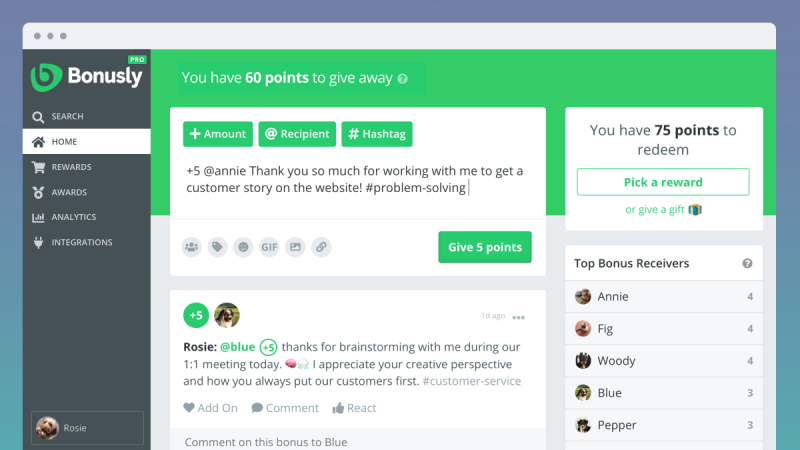
Courtesy of Bonusly
Recognizing employees publicly for their achievements is a great way to appreciate and celebrate individual and team successes. This not only enhances their self-confidence and motivation, but also encourages a positive work environment that recognizes and values the hard work of employees.
Why we love this employee reward type: Recognizing employees publicly is a great way to reward them as it fulfills their need for appreciation and validation.
How to implement this type of employee reward for your team: Make public recognition easy with a recognition tool like Bonusly!
2) Monetary Rewards
Companies provide monetary rewards to employees as financial incentives to acknowledge and appreciate their performance, achievements, or contributions. These rewards can be in the form of bonuses, commissions, profit-sharing, or salary increases.
Why we love this employee reward type: Monetary incentives are given to employees to motivate them, increasing job satisfaction, and make sure their interests are in line with the organization’s goals.
How to implement this type of employee reward for your team: For a few ideas about monetary rewards and incentives and how your managers can implement them, take a look at this article on the topic.
3) Non-Monetary Rewards
Rewards for employees that are not based on money can take many forms, such as recognition, chances to learn and advance in their careers, and efforts to support a healthy work-life balance.
Examples of these rewards include verbal praise, training opportunities, flexible work schedules, or extra time off.
Why we love this employee reward type: By providing rewards like these, organizations can motivate their employees from within and create a positive workplace atmosphere that boosts engagement and job satisfaction.
How to implement this type of employee reward for your team: Learn more about motivating your employees with non-monetary rewards here!
4) Spot Bonus
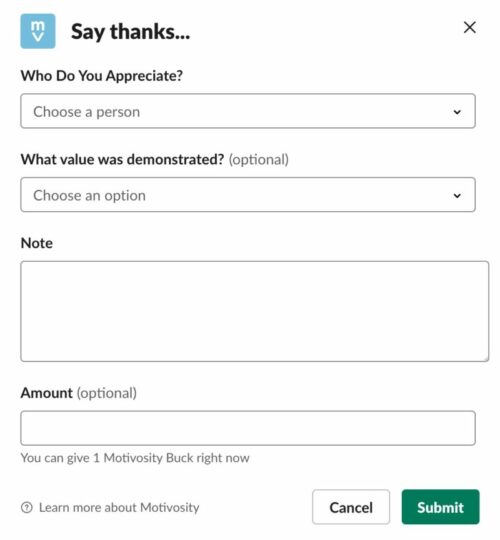
Courtesy of Motivosity
Spot bonuses are unexpected and immediate monetary rewards given to employees who demonstrate outstanding performance, go beyond their regular duties, or achieve remarkable results.
They serve as a way to acknowledge and motivate employees, boost morale, and promote a culture of excellence within the organization.
Why we love this employee reward type: Spot bonuses are very useful as they give employees immediate and unexpected rewards, causing a feeling of surprise and appreciation. They help reinforce positive behaviors and motivate employees to continue performing well. Spot bonuses also demonstrate that the organization values and recognizes its efforts. Instant recognition and gratification can significantly increase employee job satisfaction and engagement.
How to implement this type of employee reward for your team: Add some spontaneity and buzz to the workplace with spot bonuses! You can use a platform like Motivosity to send spot bonuses to your employees from anywhere! Perfect for distributed teams since the bonuses can be redeemed for real-life prizes.
5) Time
Rewarding employees with additional paid time off or flexible work arrangements is an effective way of promoting work-life balance and employee well-being.
This type of non-monetary reward shows a commitment to the personal needs and priorities of employees, resulting in increased job satisfaction, reduced burnout, and improved overall productivity.
Why we love this employee reward type: The reward shows that the company values work-life balance and considers the unique needs and priorities of its employees. Allowing employees the flexibility to manage their time and personal responsibilities creates a sense of empowerment, trust, and autonomy, resulting in increased engagement.
How to implement this type of employee reward for your team: Give your team the rest of the day off! They deserve it and it can be a great reward that lets them relax after a busy week.
6) Experience-based Rewards
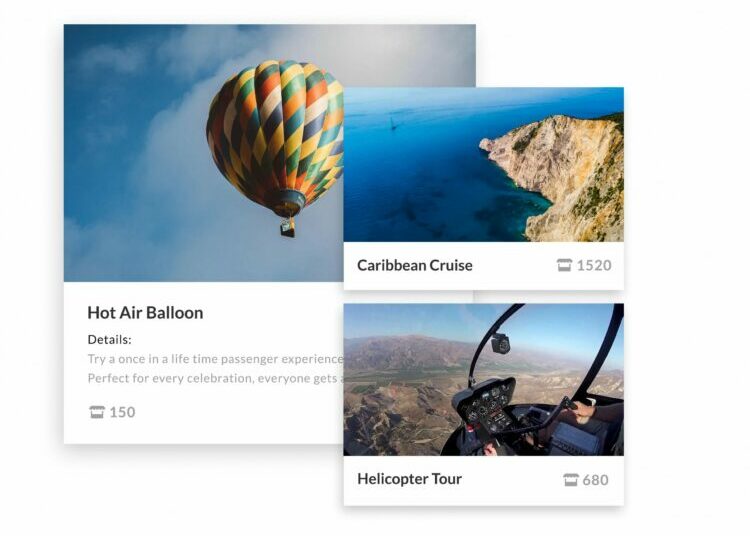
Courtesy of Bucketlist
Experience-based rewards in the workplace refer to offering employees special and unforgettable experiences as a way to acknowledge and motivate them.
These rewards could be in the form of a company-sponsored tour, group activity, or exclusive event.
Why we love this employee reward type: By providing such rewards, employees will cherish the experience for a long time, feel appreciated, and enjoy a favorable work atmosphere that prioritizes their well-being and commitment.
How to implement this type of employee reward for your team: Pick out memorable experiential gifts from a comprehensive catalog curated by the experience experts at Bucketlist. Try out their platform and see if it is a good employee reward tool for your team.
7) Incentives
Rewarding employees with incentives is a great method for motivating them and achieving desired outcomes. By linking incentives to particular goals, companies can inspire workers to perform at their peak, cultivating a culture of accomplishment and recognizing individuals for their role in the organization’s success.
Why we love this employee reward type: Employee incentives are effective rewards because they offer a clear benefit for reaching certain goals or behaviors. The possibility of earning extra rewards motivates and focuses employees, boosting engagement and aligning individual and organizational goals. Incentives foster a sense of purpose, competition, and achievement, encouraging employees to outperform and contribute to the company’s overall success.
How to implement this type of employee reward for your team: Check out our employee incentive program guide to launch one of your own!
8) Gift Cards
An effective way to reward employees and show appreciation is by using employee gift cards. It is a flexible and personalized approach that provides a tangible benefit to the recipient.
With gift cards, employees can select items or experiences that are significant to them, creating a feeling of customization and ownership in the reward while also reminding them of their contributions to the organization.
Why we love this employee reward type: This shows that the company values their individual preferences and interests, which makes them feel recognized and connected to the reward.
How to implement this type of employee reward for your team: Pick out the best of the best gift cards to reward and incentivize your employees for their brilliant contributions!
9) Perks
Offering perks as employee rewards can significantly enhance job satisfaction and employee engagement. These additional benefits, such as gym memberships, free meals, or flexible work arrangements, contribute to a positive work-life balance, promote well-being, and create a positive company culture that values and takes care of its employees.
Why we love this employee reward type: Rewarding employees with perks is a highly effective method as it shows a company’s commitment to employee well-being and satisfaction, going beyond traditional compensation. Perks improve the overall work experience, in turn, resulting in increased job satisfaction, higher productivity, and stronger dedication among employees.
How to implement this type of employee reward for your team: Employee perks can be fun for all parties, so get your perks program going after checking out this article!
10) Gifts
Rewarding employees with gifts is a considerate and customized approach to showing gratitude and acknowledging their efforts. Gifts, whether they are tangible or intangible, such as unique experiences or personalized items, can make employees feel respected and recognized, establish a favorable emotional bond, and strengthen their connection to the company.
Why we love this employee reward type: The act of receiving a gift indicates that the company has put in effort and thoughts in selecting an item that holds significance, resulting in positive emotions and a lasting impression. This can boost employee morale, dedication, and motivation.
How to implement this type of employee reward for your team: Browse through our thorough list of more than 100 affordable, morale-boosting employee gifts!
11) Manager To Employee
Giving rewards to employees is an effective way for managers to express gratitude and acknowledge the contributions of individuals on their teams. Rewards can come in different forms, such as personalized messages, one-on-one discussions, or small tokens of employee appreciation. These rewards can foster positive work relationships, improve the overall mood, and encourage a healthy work environment.
Why we love this employee reward type: When a manager recognizes and appreciates their employee’s efforts, it shows that the employee is valued. This, in turn, improves the employee’s sense of accomplishment, boosts morale, and strengthens the trust and loyalty between the manager and employee. Offering personalized rewards also helps managers understand their team members’ individual preferences and needs so that they can provide incentives that resonate and motivate them.
How to implement this type of employee reward for your team: Empower your managers by utilizing people management software and other management tools.
12) Peer To Peer
In the workplace, peer-to-peer recognition means that employees express gratitude for their colleagues’ contributions. This type of recognition creates a supportive work culture, fosters collaboration, and boosts employee engagement and job satisfaction.
Why we love this employee reward type: Recognizing employees’ efforts and accomplishments through peer-to-peer acknowledgment fulfills the basic human need for social connection and validation. When employees receive recognition from their peers, it creates a sense of being a part of the group and uplifts employee morale.
How to implement this type of employee reward for your team: Learn how to encourage peer-to-peer recognition with this mini-guide!
13) Contest Prize
Rewarding employees with contest prizes is an effective way to acknowledge and motivate them. It generates healthy competition, boosts motivation, and provides a sense of achievement and recognition for outstanding work efforts.
Why we love this employee reward type: Giving out contest prizes is a great way to reward employees because it fulfills our natural urge to compete and be acknowledged. When there’s a chance of winning something valuable, it generates enthusiasm and pride among employees, inspiring them to strive harder and do their best.
How to implement this type of employee reward for your team: Conduct employee surveys and pools via an employee survey software platform to gather feedback and preferences for contest prizes.
14) Team Outings or Events
Participating in team outings and events is a way to reward employees and promote team bonding, positive work culture, and recognize team efforts.
Why we love this employee reward type: Employees get a chance to unwind, socialize, and build relationships outside of work. This results in improved collaboration, increased morale and a sense of camaraderie among team members.
How to implement this type of employee reward for your team: Host team building activities, and icebreakers, and facilitate social situations to encourage team bonding!
15) Points-based Reward
In the workplace, points-based rewards are given to employees for reaching specific goals or milestones. These points can be used to redeem various rewards.
Why we love this employee reward type: This points system provides employees with the freedom to choose rewards that matter most to them, while also creating a sense of motivation and fun as they earn points and work towards earning desired incentives.
How to implement this type of employee reward for your team: Establish your employee points program with this step-by-step guide!
16) Years of Service Awards
Honoring and appreciating employees’ dedication and loyalty to the organization can be achieved through the use of years of service awards as a meaningful employee reward. These awards are typically given at milestone anniversaries and are symbolic of long-term contributions and the commitment of employees.
Why we love this employee reward type: Recognizing years of service not only celebrates the individual’s tenure but also reinforces a culture of loyalty, fosters employee retention, and communicates to the entire workforce that dedication and loyalty are valued and acknowledged within the company.
How to implement this type of employee reward for your team: Looking for years of service award ideas? We’ve got you covered right here.
17) Personalized Awards
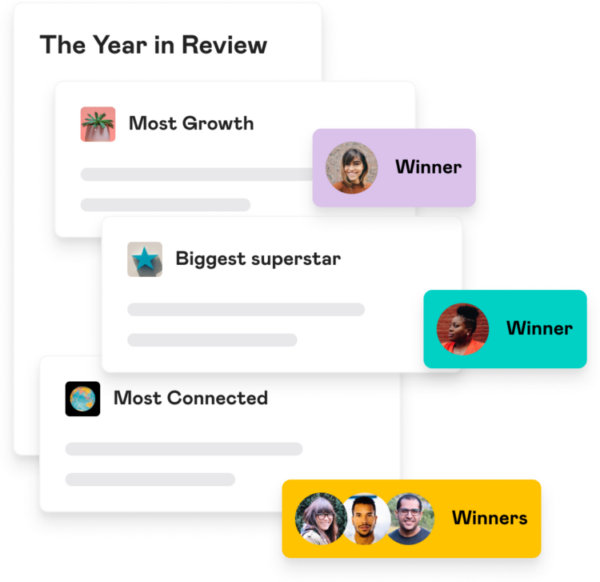
Courtesy of Mo
Using employee awards as a type of employee reward adds a special touch by recognizing and celebrating individual achievements in a meaningful way.
Why we love this employee reward type: These customized awards, such as employee of the month awards, demonstrate a deep appreciation for employees’ unique contributions and create a sense of pride, motivation, and lasting recognition within the organization.
How to implement this type of employee reward for your team: Browse this list for creative employee reward ideas to match each employee’s preferences.
People Also Ask These Questions About Employee Reward Types
Q: How do I choose the right type of employee reward?
- To select the appropriate employee reward, you should evaluate various factors. Start by collecting feedback from surveys, informal talks, or performance assessments to understand the interests and requirements of your employees. Then, link the rewards to the particular accomplishments or conduct you want to acknowledge or encourage. Take into consideration the budget, company culture, and the importance of the reward relative to the achievement. Finally, guarantee the reward is fair, transparent, and inclusive to encourage a sense of fairness and involvement among all employees. Whether you are giving out vouchers, tangible rewards and other extrinsic rewards, shout-outs via Slack or LinkedIn, a day off, gifts for top performers, or another form of recognition, your employees will appreciate the effort.
Q: How do I know if the type of reward my employee received was successful?
- To determine the success of an employee reward, take into account employee feedback, performance and behavior, team and peer feedback, employee retention and engagement, and metrics and goals related to your desired outcomes.
Q: Are there types of staff rewards that don’t cost money?
- Yes, there are a variety of staff rewards that don’t cost money. For example, you could easily implement verbal or written recognition, flexible work arrangements, special projects or assignments, additional time off, and professional development opportunities.
Q: How many types of employee rewards are there?
- There is a wide range of employee rewards; however, some of the most common ones are monetary rewards, career development rewards, time-off rewards, peer-to-peer recognition, perks and benefits, performance-based rewards, spot bonuses, gift cards and personalized rewards, experience-based rewards, and non-monetary rewards.
Q: When should I send a different type of reward to my employees?
- You should send a different type of reward to your employees depending the particular achievements you are celebrating or the behaviors you want to incentivize or recognize. Ultimately, the type of reward depends largely on the desired impact the reward will have on an individual or team. Regardless of the occasion or the reason for giving the reward, this creates a positive impact on your larger team.














